Vol 1 No. 27 TROPIC LIGHTNING NEWS September 2, 1966
Index
[The 1966 Vietnam issues of Tropic Lightning News were published in Saigon,
and are of lower quality than later years that were printed in Japan. Over
the years the photographs and text have faded and it has been difficult to
reproduce them. Even when the photos are unclear, I have been included
them to give a sense of the activities in the Division.]
Gen. Walker Receives Highest Viet Award
By 2nd Lt. Peter J. Wascher
Gen. Nguyen Cao Ky, premier of South Vietnam, and Lt. Gen. Nguyen Van Thieu,
chief of state, presented Vietnam’s highest award to Maj. Gen. John Norton, 1st
Cavalry division commander, and Brig. Gen. Glenn D. Walker, commanding general,
3rd Brigade Task Force, in a ceremony held recently at II Corps headquarters.
Korean Lt. Col. Choi Dyung Soo, along with 28 officers and men of the 3rd Bde.,
were also presented the Vietnamese awards.
All received medals for “heroic and brilliant action in defense of Vietnam”
during Operation “Paul Revere.”
Gen. Norton and Gen. Walker received the National Order 5th Class, Vietnam’s
highest award, and the Gallantry Cross with Palm for their command of “Paul
Revere.” Gen. Walker commanded the operation from May 10 to August 3. Gen.
Norton took command on August 3.
Col. Soo accepted the Gallantry Cross with Palm for the Korean 3rd Armored
Cav. Bn., Tiger Div. The award was presented primarily for the Korean action of
August 9 in which they helped rout a North Vietnamese Army (NVA) battalion.
Lt. Gen. John A. Heintges, deputy commander, U.S. Military Assistance
Command, Vietnam, represented Gen W.C. Westmoreland, COMUS-MACV.
Hundreds of captured weapons were on display south of the ceremony grounds.
“Paul Revere” has thus far accounted for over 800 NVA killed, 200 NVA
captured, nearly 400 weapons captured and large quantities of equipment and food
seized.
The following men of the brigade received the Gallantry Cross with Palm:
Capt. James. R. Maisano, Co. B, 2nd Bn., 35th Inf., (Barberton, Ohio); SSgt.
Wallach F. Ferneybough, Co B, 1st Bn., 69th Armor (Hinnesviile, Ga.); and Sgt
Clifford R. Totten, Co. B, 1st Bn., 35th Inf., (Missouri Valley, Iowa).
The following men received the Gallantry Cross with Silver Star: Capt. Ora L.
Boss,. Co. A, 1st Bn., 14th Inf., (Green Forest, Ark.); Capt. Alvino Cortez, Co.
C, 1st Bn., 35th Inf., (Sacramento); PSgt. Allen Shishido, HHC, 1st Bn., 35th
Inf., (Honolulu); SSgt.. Carl O. Johnson, Co. B, 2nd Bn., 35th Inf., (Spokane,
Wash.); PFC William Thorton,. HHC, 2nd Bn., 35th Inf., (Knoxville, Tenn.).
| Phase III of ‘Paul Revere’ The 3rd Brigade Task Force recently completed Phase II of Operation “Paul Revere” near Pleiku. “Paul Revere,” the longest single operation by an American force in Vietnam, has been divided into phases for time reasons. It remains a search-and-destroy operation to halt enemy infiltration into Vietnam. In Phase I the 3rd Brigade attained the most favorable friendly-to-enemy kill ratio of any American major command in Vietnam. At the same time it achieved the highest enemy dead, 516 for an operation. Phase I, according to Maj. Ronald J. Rabin, brigade intelligence officer, “deterred the VC and NVA from executing their monsoon offensive at a great loss in men, equipment and morale.” Phase II of “Paul Revere” kicked off August 1. A total of more than 350 NVA were killed in four major encounters. “Paul Revere III” began August 26. |
2/14th Kills 7 V. C. In One-Hour Battle
Elements of the 25th engaged an estimated reinforced rifle platoon of Viet
Cong believed to be part of a larger force in a fierce hour-long battle Sunday,
65 miles northwest of Saigon, killing seven of the enemy and suffering light
casualties.
Co. C, 2nd Bn., 14th Inf., was on the second day of a two-day
search-and-clear operation. On the previous day it accounted for six enemy
dead.
During Sunday’s action, initial enemy contact came when the company began
receiving sniper fire from treetops. The company quickly opened up on the enemy
and spotted three VC moving to their front. Several minutes later, the VC
opened up with heavy automatic weapons and 50 caliber machine gun fire from
dug-in positions 50 yards away.
The company immediately called in artillery and air strikes in an attempt to
break off the intense enemy fire.
Before leaving the scene, the friendly force had already accounted for six of
the enemy dead. The additional VC was killed by air.
During the previous day, the company was operating in approximately the same
area when it received light sniper fire from the enemy.
Upon the initial contact, a squad was deployed to the left flank, charging
across a rice paddy.
Within minutes after it moved out, the enemy hit the right front with small
arms and automatic weapons fire and another squad was deployed to halt the fire.
As the squad of infantrymen from the 25th opened up on the enemy, one VC fell
from a treetop. Meanwhile, aerial observers spotted a large VC force moving
around the area attempting to encircle the friendly force.
Artillery and air strikes were called in immediately. Shortly after the
action, recon elements spotted five dead VC killed by 10 direct rounds of
artillery. Total estimates of enemy casualties were difficult to make because
of dense underbrush in the area.
| TOP HONOR - Lt. Gen. Nguyen Van Thieu, chief of state for Vietnam, pins the National Order 5th Class, Vietnam’s highest award, on Brig. Gen. Glenn D. Walker, commander of the 3rd Brigade Task Force. |
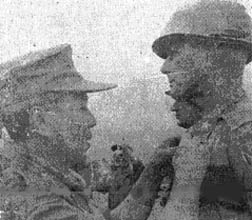 |
Change of Command At 7/11th
Lt. Col Felix Salvador of San Diego assumed command of the 7th Bn., 11th
Arty., from Lt. Col. William D. Brown of Fort Lauderdale, Fla.
The change-of-command ceremony was held at Tay Ninh, the home of the
division’s 196th Light Infantry Brigade (separate), and included the
presentation of the Legion of Merit to Col. Brown by Maj. Gen. Fred C. Weyand,
division commander.
Col. Brown leaves the “On Time” artillery unit to trade positions with Col.
Salvador, formerly the division inspector general.
Col. Salvador, an Army veteran of 22 years, received his commission from
officer candidate school after five years as an enlisted man. He served in
Europe during WW II and later in the Korean War. He joined the 25th in 1960.
 |
PINS - Maj. Gen. Fred C. Weyand, division commander pins the Legion of Merit on Lt. Col. William D. Brown of Fort Lauderdale, Fla., during change-of-command ceremonies. (Photo by PFC Vern Shibla) |
Page 2 TROPIC LIGHTNING NEWS September 2, 1966
Decorated
| SILVER STAR MEDAL | |
|
Sgt. Francisco Kawasaki Jr., 1st Bn., 8th Arty. Sgt. Horace G. Mitchell Jr., 2nd Bn., 14th Inf, (Posthumously) Sp4 Arthur D. Miller, Co. A, 25th Avn. Bn. |
Sp4 William R. Mindach, Co. A, 2nd Bn., 14th Inf.
(Posthumously) PFC William V. Pharris, Co. B, 2nd Bn., 14th Inf. (Posthumously) |
| BRONZE STAR MEDAL (VALOR) |
|
|
Cpl. Alvin T. Coombs, Co. A, 2nd Bn., 27th Inf. Cpl. Dennis K. Miyagi, HHC, 2nd Bn., 14th Inf. |
Sp4 Ashby W. Harler, HHC, 2nd Bde. PFC Michael D. Quincy, Co. A, 2nd Bn., 27th Inf. |
| AIR MEDAL (VALOR) |
|
|
Maj. Edmund B. Bookman Jr., Co. A, 25th Avn. Bn. Capt. Jackson K. Schultz, Co. A, 25th Avn. Bn. Capt. Robert S. Tamer, Co. E, 725th Maint. Bn. Capt. Ronald R. Van Regenmorter, HQ & Co. A, 725th Maint. Bn. Sp6 Edward A. Alex, Co. E, 725th Maint. Bn. |
Sp6 Richard C. Caton, Co. E, 725th Maint. Bn. Sp5 Kenneth V. Jackson, Co. E, 725th Maint. Bn. Sp5 Robert E. Lester, Co. E, 725th Maint. Bn. Sp4 Richard A. Morrell, Co. E, 725th Maint. Bn. Sp4 Richard A. O’Toole, Co. A, 25th Avn. Bn. |
| PURPLE HEART |
|
|
1st Lt. Roger D. Stager, HHC, 2nd Bn., 14th Inf. CWO William J. Connor Jr., Co. B, 25th Avn. Bn. CWO Gary H. Wilkerson, Co. B., 25th Avn. Bn. PSgt. Samuel McCarthey Jr., HHC, 1st Bn. (Mech), 5th inf. SFC Paul K. Shaffer, Co. A, 1st Bn. (Mech) 5th Inf. SSgt. James V. Arp Jr., B Trp., 3 d Sqdn., 4th Cav. |
Sgt. Roy D. Wareham, Co. A, 1st Bn. (Mech), 5th Inf. Sgt. Michael D. Westfall, HHC, 2nd Bn., 27th Inf. Sp5 Bobby L. Cox, Co. B, 25th Avn. Bn. Sp4 Charles R. Burnett, Co. B, 25th Avn. Bn. Sp4 Allen W. Davidson, 25th MP Co. |
Education
G.I. Bill And You
(Editor’s note: This is the first in a series on the Cold War GI Benefits
Program.)
Servicemen with two years active duty and veterans with service after January
31, 1955 now are eligible for many benefits formerly limited to World War II and
Korean veterans.
Major emphasis of the Veterans Readjustment Benefits Act of 1966, signed into
law March 3 by President Johnson, is on education.
The maximum period allowed will be 36 months, with entitlement earned on the
basis of one month’s education assistance allowed for each month of active duty
up to the 36-month ceiling. Thus, a three-year period of active duty would
provide enough entitlement for the usual four-year college program, allowing for
summer vacations.
There is no deadline date to enter upon an educational program and veterans
will have eight years from the date of their last discharge from active service to
complete their courses. Veterans who were discharged before the day the law was
enacted have until March 3, 1974 to complete their courses under the program.
Service members now on active duty have until eight years after their
separation from service to complete their courses.
A person’s entitlement to educational assistance under this program will be
reduced by any entitlement he may have used under the World War II and Korean
War veterans education assistance programs.
A veteran will receive a monthly allowance while attending school, which can
be a college or university, a vocational school, or a high school. The
allowance varies according to whether the student is attending full or part time
and whether or not he has one or more dependents.
|
Monthly VA Assistance |
||||
|
The monthly rate for an individual attending school on less than one-half
time basis may not exceed the monthly rate of the cost of the course. Thus the
individual would receive the amount of the monthly cost of the course or the
appropriate rate indicated in the applicable table - whichever is of the lesser
amount.
Cooperative program is a full-time program of education consisting of
institutional (school) courses and alternate phases of training in a business or
industrial establishment being strictly supplemental to the institutional
portion.
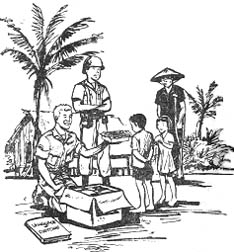 |
Your appreciation of America’s role in the world today will be broadened if
you join with the Vietnamese and learn the history of their fight for freedom
from aggression. This valiant little nation has a link with the past that stretches back some 4000 years. Vietnam today, as it has so many times throughout history, is fighting for its life against subjugation. By extending your friendship to the Vietnamese, you strengthen our alliance and measurably assist understanding between our two nations. Make a genuine effort to learn the language and customs of Vietnam. You can only broaden your personal horizons by doing so. |
LBJ Tells Why
A Speech on Vietnam
(A 1965 speech by President Johnson once again reminds us why we are in
Vietnam.)
Not long ago I received a letter from a woman in the Midwest. She wrote:
“Dear Mr. President: In my humble way I am writing to you about the crisis in
Vietnam. I have a son who is now in Vietnam. My husband served in World War
II. Our country was at war, but now, this time, it is just something I don’t
understand. Why?”
I have tried to answer that question a dozen times and more in practically
every state in this Union.
Why must young Americans - born into a land exultant with hope and golden
with promise - toil and suffer and sometimes die in such a remote and distant
place?
The answer, like the war itself, is not an easy one. But it echoes clearly
from the painful lessons of half a century. Three times in my lifetime, in two
world wars and in Korea, Americans have gone to far lands to fight for freedom.
We have learned at a terrible and brutal cost that retreat does not bring safety
and weakness does not bring peace.
It is this lesson that has brought us to Vietnam. This is a different kind
of war. There are no marching armies or solemn declarations. Some citizens of
South Vietnam, at times with understandable grievances, have joined in the
attack on their own government. But we must not let this mask the central fact
that this is really war. It is guided by North Vietnam and spurred by Communist
China. Its goal is to conquer the South, to defeat American power, and to
extend the Asiatic dominion of communism.
Most of the non-Communist nations of Asia cannot, by themselves and alone,
resist the growing might and grasping ambition of Asian communism. Our power,
therefore, is a vital shield. We did not choose to be the guardian of the gate,
but there is no one else.
Nor would surrender in Vietnam bring peace. We learned from Hitler at Munich
that success only feeds the appetite of aggression.
Moreover, we are in Vietnam to fulfill one of the most solemn pledges of the
American Nation. Three Presidents - President Eisenhower, President Kennedy,
and your present President over 11 years, have committed themselves and have
promised to help defend this small and valiant nation.
Strengthened by that promise, the people of Vietnam have fought for many long
years. Thousands of them have died. Thousands more have been crippled and
scarred by war. We cannot now dishonor our word or abandon our commitment or
leave these who believed us and who trusted us to the terror and repression and
murder that would follow.
This, then, my fellow Americans, is why we are in Vietnam.
| The TROPIC LIGHTNING NEWS is an
authorized publication of the 25th Infantry Division. It is published
weekly for all division units in the Republic of Vietnam by the
Information Office, 25th Infantry Division, APO U.S. Forces 96225. Army
News Features, Army Photo Features and Armed Forces Press Service material
are used. Views and opinions expressed are not necessarily those of the
Department of the Army. Printed in Saigon, Vietnam, by Saigon Daily
News. Maj. Gen. Fred C. Weyand . . . . Commanding General Maj. William C. Shepard . . . . . . Information Officer 1st Lt. William H. Seely III . . . . Officer-in-Charge Sp4 David L. Kleinberg . . . . . . . Editor Sp4 Adrian E. Wecer . . . . . . . . Editorial Assistant |
Page 3 TROPIC LIGHTNING NEWS September 2, 1966
Run Down on Viet Elections
Last Friday marked the beginning of the 15-day campaign before the September
11 national Constituent Assembly Election Day. The purpose of the election is
to elect assembly representatives. These men are to draw up a national
constitution.
A total of 540 hopefuls from 17 factions will be vying for 117 assembly
seats. The main factions represented are the “Khaki Party,” composed of ARVN
officers, some veterans and civil servants representing Premier Ky’s regime.
Next are the Roman Catholics, then the present members of the provincial and
regional councils elected in 1965. The fourth largest group comes from the Hoa
Hao religious sect which is headquartered in the western districts of the Mekong
Delta. The fifth group is the Chinese community.
Many of the candidates running for office are local leaders similar to these
found running for election to the state legislatures in the United States. The
new constitution is expected to result in a presidential system not unlike that
in the U.S. Among the hopefuls are a substantial number of military men. There is not
yet, however, any strong trend for a military party as in South Korea.
Absent from the candidates are the leaders of recent Buddhist-directed
“struggle movements” at Da Nang, Hue and Saigon which originally sought to
overthrow the Ky government.
The greatest political activity thus far has appeared in the I Corps area
which includes Hue and Da Nang. Traditionally these areas are the most
politically sensitive in the country.
Since U. S. gathered statistics show that some 50% of all South Vietnamese
are under 18 years of age, a total possible electorate of 6.5 million voters
emerges. Nearly four million people are expected to vote of an estimated five
million Vietnamese registered to vote.
While election plans progress, the Communist forces in South Vietnam are not
asleep. From intelligence sources and captured enemy documents come reports
that Viet Cong cadre are under orders to do all they can to disrupt the voting.
Looking at the candidates, they range in age from 25 to 78 years old with an
average age of 45. Eighteen of the candidates are females from 27 to 48 years
old.
Their backgrounds range from teachers and businessmen, civil servants and
soldiers, to engineers, technicians, politicians and notables, peasants and
landlords and one student.
The candidates are registered on 383 associated tickets and 139 single
tickets.
In addition, all U.S. employed Vietnamese civilians will be given time off
from work, without loss of pay, to vote.
South Vietnam is starting on the road to a stable governmental system. Our
role in the election is to wish them success.
|
Some Come Smiling ARRIVAL - First elements of the 196th Light Infantry Brigade arrive at Tay Ninh. Tired from a long ocean voyage, the sun and thoughts of the hard work that lies in store for them, some still had a smile for the photographer and reporters on hand to greet them. See photo feature, pages 4-5. (Photo by PFC Vern Shibla) |
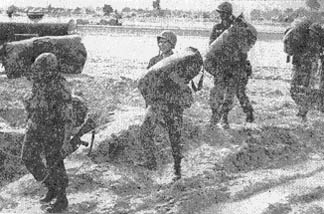 |
1/27th Breaks Up V.C. Unit
Viet Cong attempts to set up a new guerrilla company in Hau Nghia Province
were nipped in the bud recently by an alert platoon of the 1st Bn.. 27th Inf.,
“Wolfhounds.”
While waiting for demolitions to destroy VC bunkers, PFC Danny Smith of
Plainfield, N.J., heard a rustling in the bushes nearby. Investigating, he saw
two VC moving through the area. He fired his weapon, alerting the rest of the
third platoon of Co. B.
“Right away,” said Smith, “the platoon got on line and started chasing
them.” Heavy fire from the Wolfhounds wounded one of the guerrillas in the leg,
slowing him down.
SSgt. Roscoe Frazier of Washington, D. C., caught sight of the fleeing enemy
and downed him with a blast from a 12-gauge shotgun. Seeing this, the second
VC, a 15-year-old recruit, who had been a guerrilla only one week, surrendered.
The youthful VC led the platoon to a spider hole, hiding three more members
of his squad. One was the 25-year-old squad leader, a second was a 17-year-old
veteran, and the third was another new recruit, a 13-year-old boy.
Further questioning of the prisoners revealed that the squad was part of a
new company being formed in the area, about 20 miles northwest of Saigon. The
youthful squad had been picked by the leaders to operate in the area on a
“trial” basis.
In addition to the VC killed and the four captured, the Wolfhounds were led
to a dug-out housing a mimeograph machine, stencils and a large stock of paper.
In addition, a list of the other members of the company was found.
Said one Wolfhound, “If Charlie wants to start a new unit in this area, he’ll
have to start from scratch - again.”
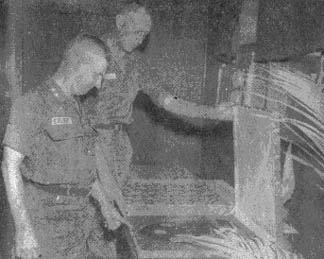 |
GOOD SHOW – Maj. Gen. Fred C. Weyand, division commander, shows Maj. Gen. C. W. Eifler, commanding general, 1st Logistical Command, Vietnam, the plazues that were presented to ROKA and ARVN representatives during a recent Symbolic Fraternity for Freedom Ceremony. Gen. Eifler recently concluded a visit to Cu Chi. |
|
Ambassador Thanks 25th
|
Page 4 - 5 TROPIC LIGHTNING NEWS September 2, 1966
[This issue of Tropic Lightning News was scanned from a bound library volume provided by the 25th Infantry Division Museum. One of the photographs and captions on pages 4 and 5 are missing, and another truncated. They were printed across the center of the 2-page-wide sheet and were hidden from sight because of the way the paper is bound into the book - the book could not be safely opened wide enough to see that part of the page.]
TO 196TH, HOME IS WHERE SPADE BREAKETH GROUND
Sweat and Strain – Then Charlie
It’s been nearly a month since the 196th Light Infantry Brigade arrived to
the Republic of Vietnam and its new home in the province of Tay Ninh.
Various units of the Light Brigade, activated at Fort Devens, Mass., in
September 1965, were originally destined for duty in the Dominican Republic.
However, ultimate plans were amended and the entire brigade was reassigned
for active duty here as part of the “Tropic Lightning” division, making the 25th
the largest infantry force in the republic.
Shown in these various photos are the officers and men of the Light Brigade
as they work hand in hand to build their new living quarters.
Tents will have to be raised, entrenchments dug, perimeters fortified,
showers and other hygienic facilities erected, makeshift plumbing installed,
supply storage built and, yes, even a kitchen sink thrown in for good measure.
And when the last nail is driven in and the last drop of sweat wiped off the
appraising brow - Charlie comes next.
|
Photos by PFC Ronnie Nelson |
 |
CHAO ONG - South Vietnamese girls pin flowers of welcome on a soldier of the 196th Light Infantry Brigade as he steps off an amphibious landing craft at Vung Tau. The brigade was airlifted to Tay Ninh where the work began. |
 |
| CHOW - Troops of the 196th take advantage of their mess hall during a lunch-time break from digging in at the new base camp. |
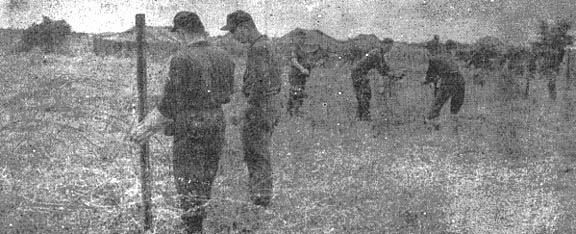 |
| WIRE - Gloved workers from the 196th stretch bundles of concertina wire while building barriers at their new base camp. |
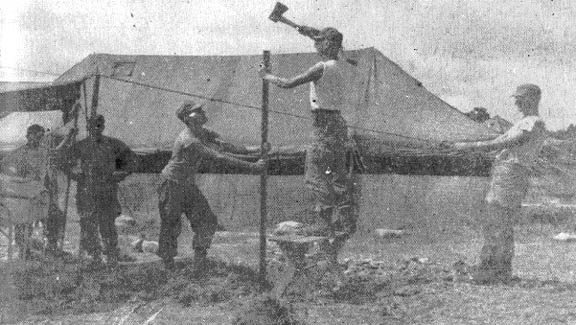 |
| STAKE - With only their strength at stake, members of the 196th set up a General Purpose (GP) Medium tent. |
| Infantrymen from the newly arrived 196th fill sandbags for constructing fortifications at their new base camp. They are currently building their camp in preparation for operations with the 25th. |
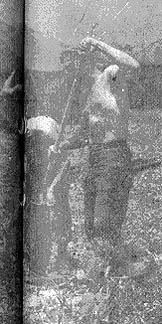 |
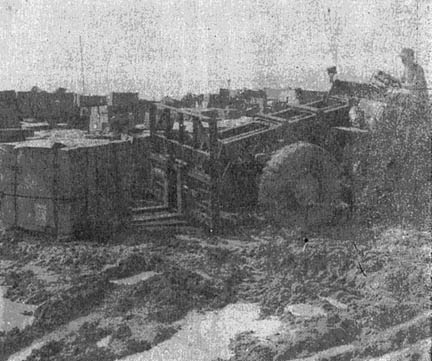 |
BOXES - A fork lift from one of three engineer support elements of the 196th moves a crate of supplies to the brigade’s base camp. |
Page 6 TROPIC LIGHTNING NEWS September 2, 1966
Sniper Bugs 4/9th Perimeter – Temporarily
By PFC Vern Shibla
First Lt. Montie W. Wofford, platoon leader, 4th Bn., 9th Inf., from Great
Falls, Mont., was sitting in a bunker on the southeast perimeter of the division
base camp.
His biggest problem at the moment was fighting off the mosquitoes that
swarmed around his head - until a hand grenade went off next to his bunker.
The grenade got rid of the mosquitoes, but left the lieutenant with a new
problem - getting rid of the VC who threw the grenade. The bunker directly in
front of Lt. Wofford’s position was being hit by grenades, but no one could tell
where they where coming from.
The moon, hidden behind dense clouds, was of little help. More grenades
landed near the bunkers.
Lt. Wofford contacted Sgt. Eddie R. Jackson of Albemarle, N.C., who was in
the bunker in front, to see if anyone was injured. One weapon had been hit by
metal fragments but no one was injured. A white star cluster was fired from a
hand-held flare gun to illuminate the area and disclose the enemy’s position.
The first flare revealed nothing, but the second silhouetted a man on a roof
top across from the bunkers and within throwing distance for hand grenades.
With precise timing, as the third flare went off, Sgt Jackson fired his M-79,
Sp4 Ronald A. Sondesky of Philadelphia Pa., fired his shotgun, and PFC Denton
Buckley of Anacoco, La., emptied a magazine from his M-16, all at the enemy
position.
It took a fourth flare to observe the damage, which left the hut riddled with
holes and a dead Viet Cong on its roof.
 |
SUE SINGER SUE - Sue Thompson sings one of her top hits to the delight division troops during a recent USO show at the division’s Lightning Bowl. (Photo by Sp5 Jose Finklea) |
Sue Thompson Rocks 4000 Men at Cu Chi
By PFC Richard Calvo
 More than 4000 men of the division recently attended Sue Thompson’s 90-minute
USO show at the division’s Lightning Bowl.
More than 4000 men of the division recently attended Sue Thompson’s 90-minute
USO show at the division’s Lightning Bowl.
Appearing with Miss Thompson was a new rock ‘n’ roll group called the “Wild
Affair.”
The show began with the Division Band playing a medley of swing tunes which
included such favorites as “When You’re Smiling,” “The Lonely Bull,” “Easy
Street” and “One Mint Julep.” Then the “Wild Affair” took the stage and
introduced the star of the show, Sue Thompson.
Miss Thompson walked on stage smiling and greeting the troops. She
introduced the members of the “Wild Affair” - Denny Martin of West Point, Neb.,
Rod Bermingham of Los Angeles, and and Chuck, also of Los Angeles, and then
proceeded to sing one of her top hits, “Oh Lonesome Me.”
The crowd cheered and whistled as the attractive vocalist continued her act.
They snapped thousands of pictures and had hundreds of Army caps autographed as
Miss Thompson walked her show through the rows of the audience.
Meanwhile, back on stage, the “Wild Affairs was turning out the pop music,
with a unique exhibition of wit and musical talent. The group kept up the
momentum of the fast-moving show as it played numerous rock ‘n’ roll requests
for the men in uniform.
After the show, Martin, the base guitarist of the group, played numerous rock
‘n’ roll requests for the men in uniform.
After the show, Martin, the base guitarist of the group, said, “This has been
the most receptive audience we’ve ever had. The guys here have really been
great. I hope we can make another trip to Cu Chi in the near future.”
Miss Thompson and the “Wild Affair” will fly to Hawaii for two shows for the
military before returning to the States.
Capt. Wins $250 For Suggestion
For his suggestion to modify the M-12 blank adapter, Capt. Neal R.
Christensen received a $250 award and citation from Brig. Gen. Glenn D. Walker,
brigade commander.
The award, the first of its type granted in Vietnam, was presented in a brief
ceremony at the 3rd Brigade command post at Pleiku.
The M-12 fits on the muzzle of the Army’s standard M-14 rifle. It is used
whenever blanks are fired. It was specifically designed for use in Army
training exercises where tactical operation are conducted against live
“aggressors.”
It increased chamber pressure enough to chamber the bulkier blank round, but
it also increases the velocity of the round.
Capt. Christensen’s invention detects and disperses the pellets from the
round. A blank utilizing the M-12 adapter can be fired within one foot of an
“aggressor” with complete safety.
The principle will be used although the final modification may not be exactly
as it was designed, a Department of the Army spokesman wrote.
Capt. Christensen’s suggestion was evaluated for adaptation by the U.S. Army
Weapons Command at Rock Island Arsenal, Ill.
Capt. Christensen has been assigned to the aviation section since the
division arrived more than seven months ago.
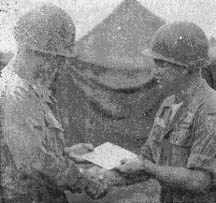 |
M14-2 - Brig. Gen. Glenn D. Walker (1) presents $250 award and citation to Capt. Neal R. Christensen of the 25th Aviation Section for his suggestion to modify the M-12 blank adapter. |
|
Hair We Go Again
|
Page 7 TROPIC LIGHTNING NEWS September 2, 1966
`King’ Visits His Wounded Handler
When PFC Lynn E. Hutchins of Calimesa, Calif., was wounded, his scout dog,
King, rode the medical evacuation helicopter with him back to the division base
camp.
King stayed with his handler until he was carried into surgery.
The German Shepherd scout dog was then taken back to his kennel with the
other dogs of the 38th Inf. Plt. (Scout Dog).
But even in a combat zone, you can’t keep a boy and his dog separated for
long. As soon as PFC Hutchins was able to receive visitors, his platoon
sergeant, SFC Arthur Porter of Cairo, Ill., brought King over to the 7th
Surgical Hospital for a visit.
Needless to say, the get-together was a morale booster for both man and
beast. PFC Hutchins was shot in the legs by a Viet Cong who popped out of a
tunnel as King was alerting on another VC hidden in the thick jungle.
Men of the 2nd Bn., 27th Inf., killed the guerrillas in a brief fire fight.
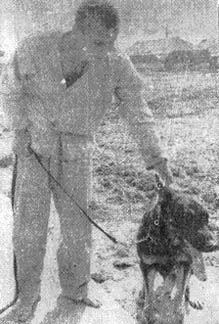 |
DOGGED - PFC Lynn E. Hutchins pets his dog King who was brought to visit his wounded handler. (Photo by Sp5 Jose Finklea) |
Snake KIA in Two-Hour Battle
By PFC DOUG KEARNEY
Lying in the marsh water became unbearable for him.
He crouched low, hugging the ground all the way, as he slipped through the
grass into the division’s base camp at Cu Chi.
Seeing his chance, he darted through the perimeter near the 4th Bn., 23rd
Inf. He was in the open now and had to reach cover. He started across a road
but suddenly – spotted!
Now abandoning all caution, he sped across the road and slipped under a
nearby building. But it was too late. Three of the “Tomahawk” men had seen
where he went.
Grab
The men grabbed the first weapons at their command, an odd assortment of
shovels, axes, poles and smoke grenades. The smoke grenades went in first, but
he refused to budge. Finally, under the constant prodding of the long poles,
the six-and-a-half foot long Crete snake slithered out.
Sp4 Theodore D. Mims, Sgt. James Butler and PFC Richard H. Carpentier
struggled to keep the poisonous snake at bay. They dropped sandbags on the
snake to hold him while they went in for the kill, but he slithered out and back
under the building.
Chasing
After two hours of chasing, prodding and pushing the men finally killed the
big snake with shovels and axes flashing in the mid-morning sun.
For Sgt. Butler it was his third kill in five days. Specialist Mims,
however, said he had seen a Crete only once before.
“I only had an M-79 grenade launcher with me,” shrugged Specialist Mims, “and
I didn’t feel like exploding a grenade right next to me, so I politely got up
and walked away.”
| TOP FAREWELL - SMaj. Jerome J. Szafranski troops the line at a farewell ceremony held in his honor by the 2nd Bn., 14th Inf. The sergeant major left the unit for a new assignment as top NCO of II Field Force, Vietnam, in Long Binh. |
 |
Smaj. Szafranski Leaves 25th
Smaj. Jerome J. Szafranski, who has served with the 25th since 1963, was
honored with a color guard ceremony by the 2nd Bn., 14th Inf., as he departed
for a new assignment as sergeant major of II Field Force, Vietnam.
After reviewing the colors, the 41-year-old combat veteran praised the men of
the battalion, saying, “You have proved yourselves in combat. You are a very
fine unit, and I am sorry that I must leave. I want you to take care of
yourselves and keep up the fine job. God bless and keep you all.”
SMaj. Szafranski of Oahu, Hawaii, entered the Army in 1943. In his 22-year
career he has been awarded the Bronze Star Medal three times and has two awards
of the Combat Infantryman’s Badge.
In his three years with the division, he served as 3rd Brigade Sergeant
Major, Division Operations (G-3) Sergeant Major, and as the top NCO in the 2nd
Bn., 14th Inf. By his own request, his last year with the 25th was spent with
the infantry battalion.
SMaj. David. L. Parker, formerly Division G-1 Sergeant Major, has been
assigned to 2/14th to replace SMaj. Szafranski.
‘Stable Boy’ Watches Helicopter Corral
When the helicopter pilots of D Trp., 3rd Sqdn., 4th Cav., fly their choppers
out of the corral, they take the “stable boy” with them. The stable boy is a
UH-IB helicopter which acts as a maintenance and recovery ship.
The airship was nicknamed stable boy by Maj. Richard W. Thomas of Wilmington,
Del. It seemed only logical to Maj. Thomas that the aircraft designated to
watch over the choppers flying from a corral should be called stable boy.
Maj. Nicholas H. Doiron of Chisholm, Maine, who pilots the stable boy along
with Maj. Thomas, explained how they worked during an air operation.
With a crew of two pilots, a crew chief and gunner, a technical observer and
a medical man, they fly above the other ships and are able to easily spot any
chopper which may be in trouble.
Sitting down beside a downed ship, the stable boy crew moves into action.
Medical aid is given to any injured and an appraisal of damage is made.
If the damage is minor, the ship is repaired on the spot. In the case of an
extensively damaged aircraft, the crew, along with weapons and radios, is
immediately evacuated. The damaged helicopter is picked up at a later time.
To date, the crew of the stable boy has recovered three downed ships, along
with the crews and weapons. During one operation recently, they also succeeded
in detaining a VC suspect until the gunships arrived.
The crew of the stable boy has become a priceless aid during air operations,
and all pilots who fly from the corral consider it only good sense to take the
stable boy along.
More U.S. Bonds, More U.S. Money
If you had $1000 when you got back to the States, what would you do with it?
Down payment on a new car? Big vacation with your wife? Color television?
Here’s how to save that $1000 painlessly and simply. Go to your personnel
office and make out a U.S. Savings Bond allotment to buy a $100 bond each month.
The cost is just $75 - your Hostile Fire pay and a little of your Federal
income tax exemption.
In 12 months you’ll have invested $900 and earned more than $20 in interest.
That’s not $1000, you say? So buy an extra bond some month.
Page 8 TROPIC LIGHTNING NEWS September 2, 1966
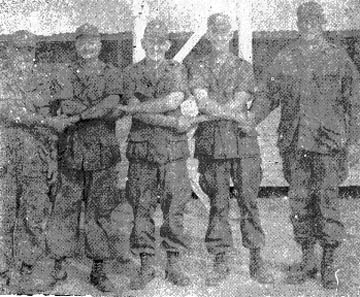 |
Signal Experience KEEP ROLLING - The commanding officer of the 125th Sig. Bn., and his four warrant officers are going a long way to prove the fighting here in Vietnam is not all for the young. The five have behind them a combined age of 226 years, of which 113 have been spent in Army green, half of which has been spent on overseas bases. Although the old barracks room ballad runs, “Old soldiers never die, they just fade away,” this group is more like, “Old man river, they just keep rolling along.” They are (1 to r) CWO Richard E. Kirkland, battalion maintenance officer; CWO Adolf Herbst, division crypto officer; Lt. Col. Thomas .J. Ferguson, CWO Joseph F.X. Burr, officer in charge, division message center, and WO Jack E. Gilmore, battalion S-4 property book officer. |
‘God With Us’
Teen Writes About Faith
Capt. John R. Gantt of Kingsport, Tenn., a helicopter pilot with the 25th Avn.
Bn., recently received an inspiring letter from a student in his hometown.
Jeanne Pierce, a 16-year-old high school student, wrote the letter.
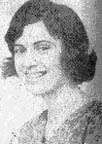 Not knowing how to send it directly to Vietnam, however, Miss Pierce decided
to ask her congressman to send it for her.
Not knowing how to send it directly to Vietnam, however, Miss Pierce decided
to ask her congressman to send it for her.
Congressman James Quillen of Tenn., who knew of Capt. Gantt’s assignment
in Vietnam, quickly forwarded the letter to him.
On reading the letter, Capt. Gantt said, “The sincerity, simplicity, faith in
God and country expressed by this young lady should be an inspiration to all of
us.”
In her letter, Miss Pierce writes: “Dear Men, I can’t call you boys, because
I don’t believe anyone who fought for his country remains a child ...I imagine
God seems sort of alien out there sometimes. It’s hard to think of God in
connection with blood, bullets and death. But he’s out there with you -
believe that. Never lose faith...
I’m 16 and for two years I’ve been trying to do something for you who are
serving our country on far-away battlefields. A teenage girl doesn’t have much
influence you know. But I do have one thing, a marvelous congressman, James
Quillen. I hope he can get this to you. I don’t even know if you want this
letter, or if it does any good, but I want to write it.
“Just remember, you are not forgotten. We here at home...love you, respect
you, admire you, pray for you, believe in you.
“Keep up the good work! If there is anything special you need, maybe you can
get word to your families. I mean, I know you can, but if they can’t send it, I
will.
“Someday, I hope to meet some of you - what an honor for me.”
Recon Team
Stronghold Found
The five-man reconnaissance team was dropped into a suspected Viet Cong
supply area 25 miles northwest of division headquarters. Their mission was to
detect and report enemy activity and strongholds in the area.
As the team sifted through the dense jungle brush, it was stopped by a sudden
noise. The men took cover in time to see a man clad in black pajamas disappear
into the thick foliage. No one followed.
As the team approached the spot where the fleeing man was last seen, it
discovered a rifle, a two-pound packet of classified documents, some medical
supplies, a North Vietnamese flag and a hat.
The team radioed their find to a nearby Special Forces camp with instructions
to have the information relayed to the intelligence branch of the division. The
recons collected the captured material and continued their search.
Afterward the team uncovered a large rice cache. The team paused long enough
to relay the information back to division headquarters. As they neared a small
clearing, they spotted a well-armed squad of Viet Cong patrolling the perimeter
of its jungle rest camp.
Artillery was called in, but exact results were not known for the team was
ordered back to the landing zone to be evacuated from the area.
The evacuation was timely, for heavy sniper fire accompanied them back to the
chopper.
Within minutes of their departure, an air strike was called in and shortly
afterward “Tropic Lightning” troops swarmed into the area.
Bootless V.C. Leave Lootless
Viet Cong guerrillas disguised themselves in South Vietnamese military
uniforms to attack government troops near Saigon recently but their feet gave
them away. They had no boots.
The commander of the regional militia noticed the bare feet of the
“government Rangers” who tried to stop their trucks and gave the alert.
The Viet Cong emptied their magazines into the militiamen and fled. They
caused moderate casualties in the platoon and also killed four civilians and
wounded five others. Only one guerrilla was found killed.
| REUP - SFC Henry A. Tucker of Concord, N.H., is the Career Counselor for the 65th Engr. Bn., 25th MP Co., the Mil. Intel. Det., the 125th Sig. Bn,. the 25th Avn. Bn., HHC 25th Division, the Chem. Det. And the 15th P.I. Det. Sgt. Tucker has been involved in recruiting work for six years at Fort Devens, Mass.; Claremont, N.H., and the 25th in Hawaii. |
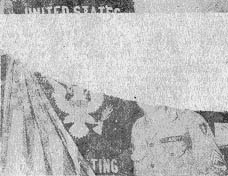 |
Thanks to:
The 25th Infantry Division Museum for providing the volume of 1966 Tropic
Lightning News,
Ron Leonard, 25th Aviation Battalion for finding and mailing them,
Kirk Ramsey, 2nd Bn., 14th Inf. for creating this page.
This page last modified
12-31-2007
©2007 25th Infantry Division Association. All rights reserved.